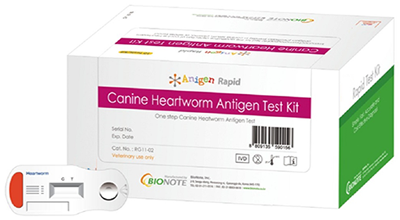Trousse de Détection d' Antigène du Ver du Coeur Chez le Chien
Un test qualitatif d’immuno-migration in-vitro pour la détection de l’antigène Dirofilaria immitis du ver du coeur dans le sérum, plasma, ou sang total du chien.
Les vers du coeur (Dirofilaria immitis) sont des vers parasites assez larges qui, à maturité, vivent dans le coeur, les artères et les poumons du chien infecté. Bien que les chiens sont les principaux hôtes de ce parasite, les chats peuvent aussi être infectés. L'infection se propage quand les larves du ver du coeur passent d'un chien infecté à un animal non-infecté par piqûre de moustiques infectés.
Les tests commerciaux détectent les antigènes des vers femelles adultes. Jusqu'à présent, aucun test commercial n'est capable de détecter les vers du coeur chez un chien qui est infecté uniquement avec des vers mâles. Pourtant, dans une étude récente, les chiens infectés uniquement par les vers mâles représent 5% de tous les cas confirmés à l'autopsie.

Caractéristiques de l'Anigen Trousse de Détection Rapide:
- Anticorps hautement purifiés produits par la biotechnologie pour la détection et la capture d'antigènes des vers du coeur
- Extrêmement sensible et spécifique
- Résultat rapide à partir de 5 minutes
- Simple et facile à utiliser
- test de confirmation gratuit pour les clients des États-Unis
- Peut être utilisé avec le sérum, le plasma, et le sang total
- Entreposage à température ambiante (2°-30°C)
- Petit volume d'échantillon (40µl)
- 2-an date de péremption

Trousse de Détection d' Antigène du Ver du Coeur Chez le Chien - 10 à 100
Le Trousse de Détection d' Antigène du Ver du Coeur Chez le Chien est un test qualitatif Dirofilaria immitis antigène en sérum, plasma, ou sang total du chien (voir la notice pour informations complètes)
Two large scale studies using 109 samples in the first and 174 in the second were conducted. The sensitivity was 96.4% and the specificity was 100% in the first study; the sensitivity was 94.4% and the specificity was 100% in the second study. In a multicentric field trial study conducted in the US, the sensitivity and specificity were found to be 100%. In a study conducted using samples obtained from animals for which adult male worms alone or mixed with adolescent worms, but without any adult female worms, were recovered at necropsy, the sensitivity was 100%.
Frequently Asked Questions
We recommend EDTA or heparin for whole blood collection, however you can also use citrate. If results are doubtful, please use serum.
The assay diluent is specific to our test. We do not recommend the use of any other solution as we cannot guarantee that the product will work properly.
Any positive result should be confirmed prior to initiating heartworm treatment. A confirmatory test should use a different antigen detection method as the original screening test, thus we recommend a Knot test for detection of microfilariae and a well-ELISA. Moderne vétérinaire Therapeutics offre des tests de confirmation gratuit pour nos clients américains grâce à notre laboratoire à Miami. Please email info@modernveterinarytherapeutics.com for more information on obtaining an approval form for this service.
A false positive (or negative) result from an individual animal not resulting from technique errors will continue to occur on multiple tests of the same type. Therefore, the false result is usually caused by some unique characteristics of the particular animal, as opposed to a defective test. This characteristic could be a component of the animal’s blood, which is able to react in a test’s system to show a positive result in the absence of heartworm antigens or a negative result in the presence of heartworm antigens.
The following situations may cause this situation:
- Animal could have adult worms that die and be left with circulating microfilariae
- Microfilariae could be Dipetalonema reconditum, a parasite which does not produce the immitis antigen that our test detects.
- Young dogs born to heartworm-positive mothers could be infected transplacently and be born with circulating microfilariae, but not have adult immitis, therefore no detectable D. immitis antigen.
- Occasionally, microfilariae will be present before detectable levels of antigen have accumulated.




